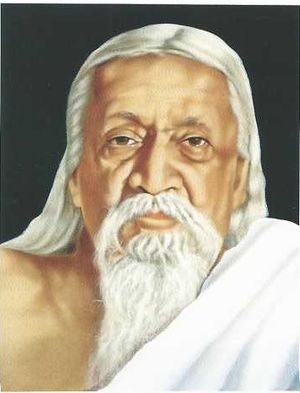Aurobindo
By Swami Harshananda
Śri Aurobindo (1872-1950) is one of the bright stars of the modern era who left behind him a legacy, a philosophy and an institution. He was born on the 15th August 1872 as the last son of Dr. Krishna Dhan Ghosh and Swarnalata Devi at Konnagar of West Bengal. He had his early education at the Loretto Convent School of Darjeeling.
After two years, in 1879, he was taken, along with his two elder brothers, to England for further education. He lived there for 14 years. His early coaching was done by Mr. and Mrs. Drewett. He had his higher education at the St. Paul’s School of London and King’s College at Cambridge. He became an adept not only in English but also in the classical European languages like Greek, Latin, French, Italian and German.
Aurobindo passed the open competition for the Indian Civil Service (I. C. S.) in 1890, but failed to complete it since he felt no interest for it. During this period he had already become well acquainted with the political upheaval in the motherland and the atrocities of the alien British government to the countrymen.
Aurobindo returned to India in 1893 and accepted service under the Maharaja of Baroda in which he continued till 1906. Throughout this time he had kept in touch with the political movement and proved to be a source of inspiration for the young revolutionaries. His writings in the papers like the Jugantar, Induprakāśa and Bande Mātaram very highly provoked youth towards this revolution and came under the evil eye of the British government.
Aurobindo's call for boycotting the foreign goods, substituting national schools for the government institutions, creating arbitration courts for people and attempts to form the nucleus of a national army added to his problems with the government. Before being acquitted he was arrested in 1908 in the Māṇiktala Bomb Case and was jailed for a year.
Right from 1904 he had taken a deep interest in the practice of yoga. In 1908 he received some help and guidance from Śri Lele, a Mahratta Yogi. When he was in jail, he stated that he had some mystic experiences like hearing the voice of Vivekananda instructing him on some aspects of yoga.
Aurobindo started two weeklies, Karmayogin (in English) and Dharma (in Bengali) which had a fair large circulation. Meanwhile his association with politics and the Indian National Congress continued. However due to a strong inner urge he took a sudden decision to depart for Chandernagore, a French settlement. He left the editing of the Karmayogin in the hands of Sister Nivedita, one of his close acquaintance. He later shifted to Pondicherry in 1910 where he lived till he breathed his last, on the 5th December, 1950.
In Pondicherry he totally dedicated himself to yogasādhanā and guided the people who gathered around him. Slowly and gradually an Ashrama grew around him. Mrs. Mira Richards, a French admirer, later known as the Mother, who had come into contact with him in 1914, started living there and took over the management of the Ashrama by 1922.
Philosophy[edit]
His taught that behind the appearances of the universe, there is the Reality of a Being and Consciousness, the Self of all beings and things. This Being is involved in each and everything that is happening. Evolution is the method by which it liberates itself. Life is the first step of this release of consciousness. Mind is the second. The next step of evolution must be towards the development of Supermind and Spirit as the dominant power in the conscious being. Man has to exert himself consciously to evolve to this level. The method to attain it is the ancient psychological discipline and practice of yoga. This will help the descent of the higher, supernatural, principle into the mind. After that One's Self is discovered and the supra-mental consciousness transforms and divines the human nature.
Notable works[edit]
- Sāvitrī, a long poem of 24,000 lines in verse, is his magnum opus.
- He has delineated his philosophy in another great work, The Life Divine.
- Essays on the Gitā
- The Synthesis of Yoga
- The Secret of the Vedas
References[edit]
- The Concise Encyclopedia of Hinduism, Swami Harshananda, Ram Krishna Math, Bangalore

